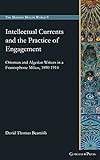Intellectual Currents and the Practice of Engagement : Ottoman and Algerian Writers in a Francophone Milieu, 1890-1914 / David Beamish.
Material type: TextSeries: The Modern Muslim World ; 9Publisher: Piscataway, NJ : Gorgias Press, [2021]Copyright date: ©2021Description: 1 online resource (212 p.)Content type:
TextSeries: The Modern Muslim World ; 9Publisher: Piscataway, NJ : Gorgias Press, [2021]Copyright date: ©2021Description: 1 online resource (212 p.)Content type: - 9781463242398
- 9781463242404
- 956/.015072 23
- DR438.8 .B43 2021
- DR438.8
- online - DeGruyter
| Item type | Current library | Call number | URL | Status | Notes | Barcode | |
|---|---|---|---|---|---|---|---|
 eBook
eBook
|
Biblioteca "Angelicum" Pont. Univ. S.Tommaso d'Aquino Nuvola online | online - DeGruyter (Browse shelf(Opens below)) | Online access | Not for loan (Accesso limitato) | Accesso per gli utenti autorizzati / Access for authorized users | (dgr)9781463242404 |
Frontmatter -- TABLE OF CONTENTS -- ACKNOWLEDGMENTS -- NOTES ON TRANSLITERATION -- INTRODUCTION -- CHAPTER 1. REPURPOSING THE PAST: HISTORIOGRAPHY IN OTTOMAN AND ALGERIAN TEXTS -- CHAPTER 2. IN DEFENSE OF ISLAM: PROVIDING ‘AUTHENTIC PERSPECTIVE’ -- CHAPTER 3. MAKING OTTOMANS AND FRENCHMEN: FORMS AND CONSTRUCTIONS OF IDENTITY -- CHAPTER 4. RESHAPING THE STATE: QUESTIONS OF REFORM AND DEVELOPMENT -- CONCLUSION -- BIBLIOGRAPHY -- INDEX
restricted access online access with authorization star
http://purl.org/coar/access_right/c_16ec
The late nineteenth and early twentieth centuries saw a great increase in the use of the printed word and the press by non-European actors to express and disseminate ideas and to participate in the intellectual life of both their home societies and a wider international context. This book examines the French-language writings of Ottoman and Algerian writers between 1890 and 1914. The volume of engagement by these figures in the French-language intellectual and journalistic space is a historical phenomenon that reflects a particular mode of engagement with the West in the decades before the First World War. Rather than analyse these writings through the lens of their connection to particular specific groups, such as Young Turks or Young Algerians, this book aims to take this body of work as a unique category of textual production that performed a specific function. By tracing the works of a wide variety of Ottoman and Algerian writers across multiple platforms in this period, it is possible to conclude that these individuals were engaged in more than acts of political opposition. Rather, they were working to situate themselves within a specific cultural and intellectual space. The book is organised around four thematic chapters that appear throughout these writings across the timeframe. They are: the presentation and function of history, the nature of Islam, the question of identity and citizenship and the shape of reform. By analysing their commonalities, differences and development, we can draw conclusions about this type of intellectual activity that transcends political movements, religion and nationality.
Mode of access: Internet via World Wide Web.
In English.
Description based on online resource; title from PDF title page (publisher's Web site, viewed 01. Dez 2022)


